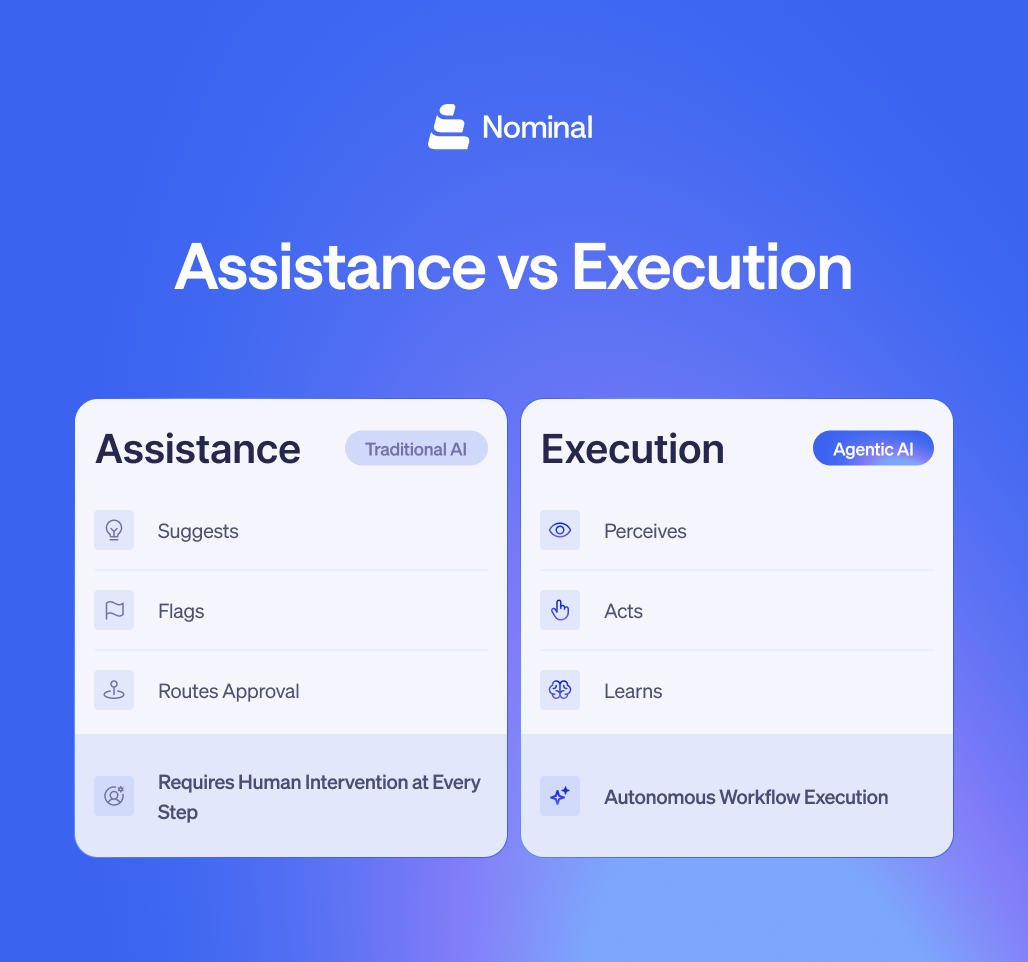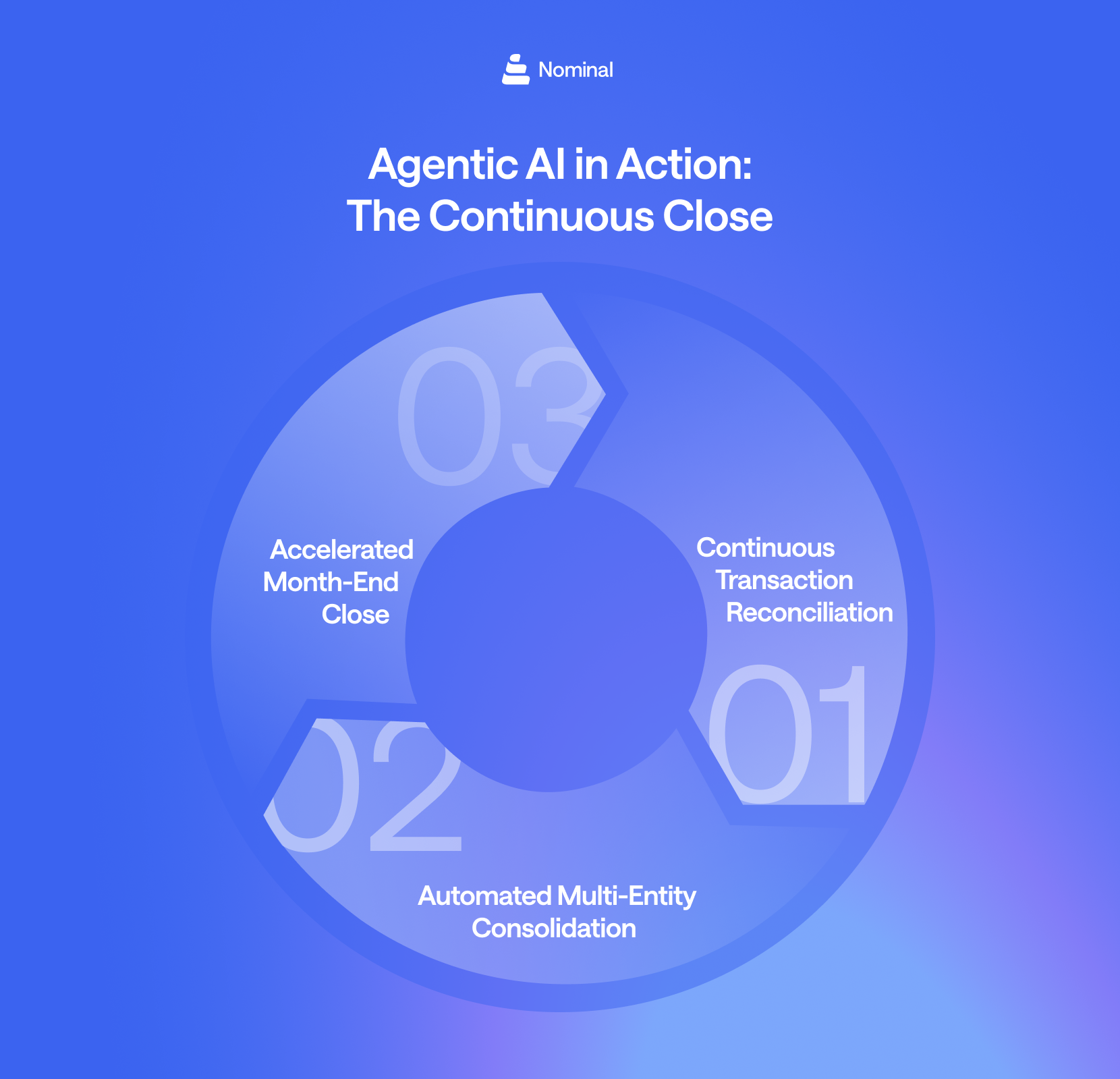
Agentic AI in finance enables corporate finance and accounting teams to automate complex workflows by perceiving data, acting independently, and learning continuously. From reconciliations to close, it reduces manual effort, improves accuracy, and empowers teams to shift from reactive busywork to strategic, high-value decision-making.
Despite decades of technology investment, the core challenge for finance teams remains execution capacity. Expectations for speed, accuracy, and cost have never been higher, yet resources remain fixed. Controllers and CFOs are under constant pressure to deliver faster closes, real-time visibility, and error-free reporting while managing increasingly complex multi-entity operations. Traditional automation helped for a while, but the gains have plateaued.
The problem is not effort or talent. It is architecture. Most finance systems were designed to record and report, not to act. Even advanced automation tools still depend on human intervention at every step, from reconciliations to consolidations to variance explanations. This leaves teams trapped between manual workload and limited automation, spending valuable hours managing processes that never truly run on their own.
A new operational model is emerging to address this gap. Agentic AI in finance brings autonomous execution to the corporate finance function, allowing intelligent agents to manage accounting workflows from start to finish.
Instead of simply assisting humans, these systems execute continuously, learn from outcomes, and improve over time. The result is faster closes, fewer bottlenecks, and a finance function that operates with the same reliability as any other business infrastructure.
What Makes Agentic AI Different From Traditional Automation?
For years, finance leaders have turned to automation to ease workload. Yet most solutions only shift where the work happens rather than remove it. This is the fundamental limitation of traditional tools.
Robotic process automation performs well in static environments but fails when data formats or systems change. Each exception still requires a human to step in, creating new maintenance work instead of efficiency.
Generative AI tools can draft summaries or respond to queries, but they cannot execute. They suggest and assist, leaving approvals, reconciliations, and postings to humans.
Workflow automation only rearranges steps. Routing approvals or digitizing checklists speeds coordination, but does not eliminate manual accounting. Someone still must complete the reconciliation, prepare the journal entry, and verify balances.
These approaches make processes slightly faster, not fundamentally better. Finance teams need technology that does the work, not technology that helps them do it faster.
Agentic AI in finance is an autonomous system that perceives, analyzes, acts, and learns within accounting and finance workflows. It is not a smart macro; it is like a digital team member for the finance department. It is a structural change in how financial operations run, replacing static automation with systems that can act autonomously.
From Assistance to Execution: The Core Shift in Corporate Finance
The distinction between assistance and execution defines the next era of finance technology. It is the difference between a tool that highlights a problem and a system that solves it.

The "assistance" model is what most finance teams use today. An AI assistant might highlight a variance in intercompany matching and suggest possible eliminations. It routes an approval to the right person. It flags a potential error. In all these cases, the human still does the core accounting work: the investigation, the posting, and the final documentation.
The "execution" model, powered by Agentic AI, is fundamentally different. Agents perform the reconciliation, post entries, and document results. They own the workflow. As one of our co-founders put it, the agent executes while humans supervise outcomes. This creates a hybrid model where automation carries the workload and professionals focus on governance and analysis.
This transition defines the difference between automation that supports and automation that acts. It is not about replacing expertise but elevating how that expertise is applied. This is the key differentiator that solves the capacity bottleneck for finance operations.
How Agentic AI Works in Corporate Finance Operations
Agentic AI applies across core accounting workflows, delivering efficiency and consistency throughout the close cycle. This autonomous execution model transforms the most complex and time-consuming tasks into continuous, reliable processes.

Accelerated Month-End Close
Instead of dedicating entire teams to the month-end close process, autonomous agents manage the process for each entity. They validate transactions continuously, not just at period end. They execute recurring journal entries and produce close documentation in real-time.
Finance teams handle exceptions and review results rather than spending days gathering data. What previously required ten days of intensive manual effort now completes in hours because execution happens continuously rather than in compressed periods.
Automated Multi-Entity Consolidation
Consolidating financials across subsidiaries or regions is one of accounting’s most complex tasks. Agents handle this automatically by matching intercompany transactions, preparing elimination entries, and consolidating balances.
They maintain accuracy across currencies, entities, and ownership structures without requiring spreadsheet coordination. This is crucial for multi-entity organizations where teams cannot always coordinate perfectly.
Continuous Transaction Reconciliation
When transaction volumes grow, manual reconciliation becomes impossible to sustain. Agents reconcile continuously between systems and accounts, flag variances, and post corrections as they happen. They remove backlogs and maintain up-to-date visibility without waiting for month-end. This continuous process is a core part of the Agentic Performance Management framework, ensuring that the books are always near ready to close.
The Organizational Impact of Adopting Agentic AI
Adopting Agentic AI changes more than processes. It reshapes how finance organizations scale, operate, and create value. It fundamentally alters the capacity constraint that has plagued finance for decades.
Scalability Without Adding Headcount
Traditional models expand linearly with headcount. Agentic operations scale instantly as complexity grows. Finance teams can support new entities or business lines without proportional staffing increases.
This is the core message for modern CFOs: the ability to scale revenue while keeping General and Administrative costs at bay. When the business acquires new entities, agents extend their execution automatically without requiring additional headcount.
Elevating the Role of Finance Professionals
When agents handle execution, accountants focus on process design, performance analysis, and decision support. The work becomes more strategic and rewarding, improving retention and engagement.
Finance professionals apply judgment and expertise to process design rather than burning capacity on administrative execution.
Real-Time Visibility and Control
Agents operate continuously rather than in monthly cycles. Finance leaders gain instant insight into performance, exceptions, and emerging risks, enabling proactive decisions instead of retroactive analysis. Close timelines become predictable, results remain stable, and operations continue smoothly regardless of personnel changes or peak workloads.
This model turns finance from a reactive function into a continuous system of performance management.
A Smarter Model for the Modern Finance Function
The technology enabling this shift did not exist until recently. Previous automation relied on rigid rules and predictable data structures, which collapsed under variation. Recent breakthroughs in AI reasoning, data integration, and exception handling have changed that. Autonomous agents can now interpret accounting data, learn from feedback, and adapt to real-world conditions.
The most powerful differentiator is the philosophy: Nominal automates your mistakes. Unlike competitors who automate invoices or expense categorization, Agentic AI automates error detection and correction. It shows unmatched transactions, misclassifications, and discrepancies before close, working within existing processes rather than forcing process changes.
The finance organizations winning in the next decade will not be the ones with the biggest teams. They will be the ones running on autonomous execution, letting agents execute operations while their talent drives actual business value. Agentic AI in finance transforms the corporate finance function from a reactive department into a continuous system.
Ready to see what autonomous execution looks like in practice? Book a demo to see how Nominal’s platform for agentic AI in finance helps your team close faster and operate with continuous confidence.





